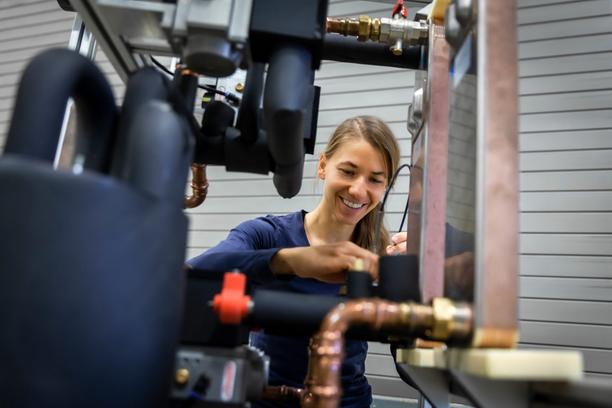German Engineers Develop new Brine Propane Enhanced Heat Pump

Engineers in Germany have made significant strides in developing a functional brine heat pump that operates with remarkable efficiency. This breakthrough technology utilizes a fully hermetic compressor and requires only 146g of propane while delivering an impressive heating capacity of 11.4kW. The reduced refrigerant charge allows installation inside buildings without requiring extensive safety precautions. Compared to existing systems, this innovative solution uses approximately one-fifth of the propane per kilowatt heat output.
This groundbreaking achievement resulted from a collaborative effort between the Fraunhofer Institute for Solar Energy Systems ISE and an industrial consortium within the LC150 (Low Charge 150g) project, which recently concluded. The project received funding from the German Federal Ministry for Economic Affairs and Climate Action.
Throughout the LC150 project, the team meticulously set up, measured, evaluated, and optimized over 20 different heat exchangers and compressor combinations. In October of the previous year, the team announced a significant milestone, developing a heat pump refrigerant circuit that achieved a maximum heating capacity of 12.8 kW and a COP (Coefficient of Performance) of 4.7 using only 124 g of propane. However, this earlier version employed an automotive compressor, which was not explicitly designed for a heat pump’s extended operating hours and lifespan. The latest development now utilizes a fully hermetic compressor, enhancing its reliability and longevity.
Dr. Lena Schnabel, head of the heating and cooling department at Fraunhofer ISE, explained the project’s objective: to develop a nearly market-ready heat pump module that utilizes the environmentally friendly refrigerant propane, stays within the 150 g limit for indoor use, and still provides sufficient heat for single-family homes. The collaborative efforts with industry partners have successfully achieved this goal, equipping them with the necessary tools to create a market-ready heat pump.
The research team employed commercially available components for the prototype, with a critical part being the asymmetrical plate heat exchangers which require less refrigerant. They significantly reduced the refrigerant requirements by minimizing the amount of oil in the compressor and employing other innovative techniques. Furthermore, the design prioritized minimal components and shorter pipes to reduce overall refrigerant usage.
The researchers launched the LCR290 project in December 2022, building on their success. This new project aims to develop efficient heat pump solutions for multi-family houses, replacing gas and oil heating systems with easily implementable and widely applicable alternatives. The project partners will focus on developing heat pump solutions for floor heating systems, central heating systems installed indoors, and higher-performance heat pumps for outdoor installations.
The LCR290 project has a budget of €7 million and is also funded by the German Federal Ministry for Economic Affairs and Climate Action. It is scheduled to run until June 30, 2025. It will draw on the insights from the LC150 project to develop suitable storage and source concepts, hydraulic and source system connections, and practical control approaches for floor heating systems.













